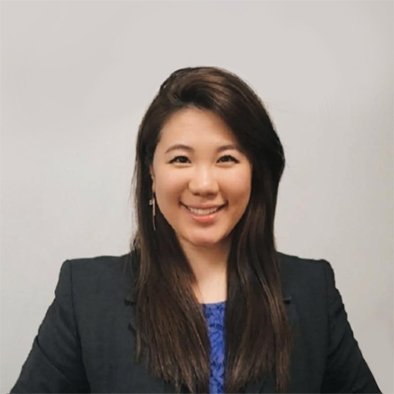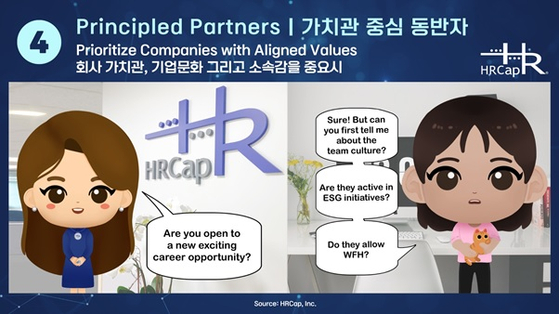[전문가 칼럼] 6가지 MZ세대 커리어 유형: (4) '가치관 중심 동반자’
DEI·CSR, 기업정책이 아닌 기업문화

스텔라 김 HRCap, Inc. 상무(Chief Marketing Officer)
이들은 자신의 가치관을 제일 중요시하는 MZ세대다. 이 유형의 인재들은 새로운 포지션으로 연락하면 ‘기업 조직문화에 대해 먼저 설명해 달라’고 하는 경우가 많다.

HRCap
즉 이들은 직장에서 성공하기보단, 자신의 가치에 부합하는 기업에서 일하는 것을 우선시하며 진정성과 소속감을 느끼며 기업과 동반성장하고 싶어한다. 바꿔말하면 이런 MZ세대는 가치관에 맞지 않거나 소외감을 느끼는 순간 퇴사를 결심하며, 입사시 꿈꿨던 비전과 가치에 동떨어진 현실에 실망하면 미련없이 떠난다.
많은 기업들이 우수인재를 확보하고 브랜드 마케팅을 위해 DEI를 외치고 있지만, 아직까진 그 중요성에 대한 인식이 높지 않은 것이 현실이다. 매출 증가에 기업규모가 더 커지고, 경영환경이 더 좋아져 회사사정이 여유로워지면 그 때 DEI를 고려하겠다는 기업이 대부분이다.
그러나 DEI는 단순한 구호가 아닌, 기업이 지속성장가능한 경영을 위해 반드시 이행해야 할 사안이다. DEI가 조직기반에 내재화할 수 있도록 경영진의 적극적인 참여와 지속적인 투자가 있어야만 지역사회와 함께 동반하는 기업, 일하기 좋은 직장으로 만들어갈 수 있기 때문이다.
많은 이들은 주류사회의 아시안리더, 테크 스타트업의 여성대표, 공룡기업에 근무하는 젊은 패기의 임원을 보면서 소속감을 느끼게 되고 희망을 가지며 근무하게 된다. 소속감은 가치관을 중요시하는 MZ세대들에게 안전함과 안정성을 가져오며, 이들이 자유롭게 소통하며 당당히 근무할 수 있게 해준다.
사회적책임기업(CSR) 활동 역시 기업이 꼭 이행해야 할 또 하나의 경영 사안이다. CSR는 ▶경제적 책임 ▶법적 책임 ▶윤리적 책임 ▶자선적 책임 등으로 구분할 수 있다. 분야별 과제로는 환경보호, 탄소배출량 감소, 일자리창출, 소비자 권익 보호, 자선적 기부, 소수인종과 여성에 대한 공정한 대우 등이 있다. 일례로 코카콜라가 제품원료로 사용된 물의 100%를 지역사회에 돌려준다는 목표로 30년 이상 지역사회 발전과 환경보호에 기여한 것, 세일즈포스의 1-1-1 모델(제품의 1%, 자본의 1%, 직원시간 1%에 해당하는 금액 기부) 등이 있다.
결론적으로 말하면 DEI와 CSR는 기업정책 혹은 과제달성이 아닌, 기업문화와 가치로 내재돼야 한다는 점이다. 기업 이름을 내건 홍보성 기부보다는, 임직원 모두가 자발적으로 참여하고 실천하는 사회 봉사가 더 가치롭다. 가치관을 중요시하는 MZ세대 인재들을 위해 가치중심 조직을 구축하고, 가치창조경영을 하는 조직문화를 만들어 세상을 함께 바꿀 수 있는 인재집단으로 육성해야 한다. 평생 잊지 못할 영감, 흔들리지 않을 열정을 불어넣어 줄 수 있는 그런 가치관 중심 리더십을 갖춘 상사가 있는 곳이라면, 누구라도 오래 근무하고 싶을 것 같다.
[Expert Column] 6 MZ Generation Career Categories: (4) ‘Principled Partners’
Following the “Eager Entrepreneurs,” “Refined Reskillers,” and “Introspective Idealists,” the fourth MZ Generation Career Category is the “Principled Partners.”
These are the MZ Generation employees who prioritize ethics and values. When asked if they are open to consider a new job opportunity, many from this category respond by first asking about the corporate culture.
Diversity, equity, and social responsibility is extremely important for the MZ Generation, who want to feel inclusion and belonging. According to EY, 63% of MZ Generation believe it's important to work for an employer with shared values, and according to TalentLMS, 77% consider it highly important that their company supports DE&I (Diversity, Equity & Inclusion) efforts.
Therefore, Principled Partners are less concerned about succeeding at work, and more driven by feeling genuinely engaged and represented, and growing collectively with the organization with shared values. As such, many choose to leave immediately if they ever feel disengaged, excluded, or even misled by the company who does not live up to its initial commitments.
Many organizations have proactively included DEI in their corporate initiatives to strengthen their market positioning and attract more qualified talent. However, they fail to truly understand the importance of DEI. Some are delaying and looking to invest in DEI if they become more profitable and large-scale, when the market improves, and once the organization has more resources.
However, DEI is not a simple slogan nor a checklist, but a critical issue that companies must actively address for sustainable growth and management. DEI must be internalized and all leaders need to truly believe in creating a more diverse, equitable, and inclusive environment. Only then can the company become a highly desired place of work that unites employees and gives back to the society.
Feeling of belonging is extremely important as it instills hope, drives engagement, and allows productivity. For instance, representation of Asian leaders at a mainstream society, female executives at tech startups, and young management at dinosaur companies bring about a sense of belonging, safety, and stability to minority groups. This allows the MZ generation to lean in and become more vocalized in their workplaces.
Corporate Social Responsibility (CSR) is another critical commitment to building corporate culture. The CSR pyramid can be divided into Economic, Legal, Ethical, and Philanthropic Responsibility. CSR activities can include environmental protection, reduced carbon emissions, job creation, protection of consumer rights, charitable donations, and equity and inclusion of minorities and women. For over 30 years, Coca-Cola has committed to their water replenishment goal of returning 100% of the water used in their manufacturing processes back to nature and communities in need, while Salesforce's 1-1-1 philanthropic model gives back 1% of product, 1% of capital, 1% of employee time to the community.
Therefore, DEI and CSR must become corporate values and culture, not corporate policy or achievement. Instead of cutting a large promotional check to donate to a cause, it is far more organic and purposeful when employees come together on a meaningful cause and volunteer their time.
Organizations must also continuously hire and develop talent who will prioritize building a culture grounded on values and lead by action to meet DEI and CSR commitments.
After all, we all want to work for a leader who continuously inspires and genuinely supports our values.
Stella H. Kim, SPHR
HRCap - Chief Marketing Officer & Global VP
스텔라김 / HRCap, Inc. 상무 (Chief Marketing Officer)










with the Korea JoongAng Daily
To write comments, please log in to one of the accounts.
Standards Board Policy (0/250자)